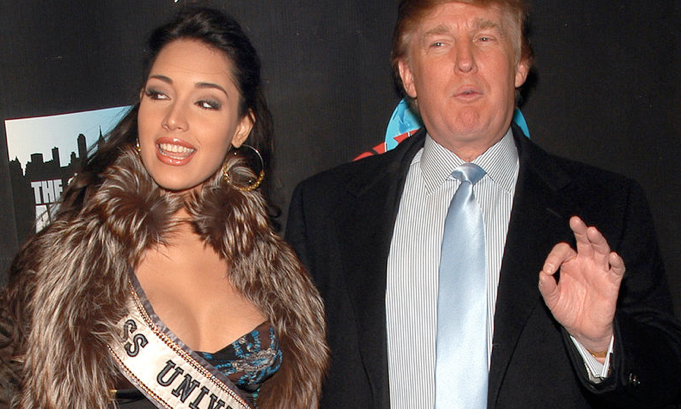CommentsTHIS IS WHAT I KNOW-As we head to the last weeks of the most contentious election cycle in my memory, I’ve come to realize that our choice is much bigger than who will reside at 1600 Pennsylvania Avenue. Certainly, we need to consider party platforms, candidates’ views on the economy, foreign policy, SCOTUS nominations, immigration, and civil rights. We need to look at which candidate is best qualified to serve as president.
Perhaps it’s neither irony nor a coincidence that in the first election where a woman is on top of a major party ticket, her opponent has a decades-long history of sexual objectification and attempts to humiliate women. This election is a referendum on feminism and the way we see women in a fast-evolving world.
For decades, Donald J. Trump has included his “bad boy” objectification of women as part of his brand. He’s made countless guest spots on Howard Stern, where their shtick typically included rating, ranking, and discussing female celebrities in graphic sexual terms. In December 2004, Trump initiated a discussion about then 18-year old Lindsay Lohan that was capped by his observation that “deeply troubled women are the best in bed.” He approved of Stern referring to his daughter Ivanka as “a piece of ass” and jokingly agreed when Stern’s sidekick Robin characterized him as a predator.
Trump shares his ideas about women whether or not he believes the mic is hot. In 1994, he told Primetime Live’s Nancy Collins that “putting a wife to work is a very dangerous thing,” blaming the demise of his first marriage to putting wife Ivana in a management position at one of his Atlantic City casinos.
Three years earlier in May 1991, he was quoted in an Esquire magazine profile about bad press, “You know, it doesn’t matter what they write as long as you’ve got a young and beautiful piece of ass. But she’s got to be young and beautiful.”
The Republican candidate’s Twitter account has been his arsenal to disparage the looks of any woman who criticizes him, from Arianna Huffington to New York Times columnist Gail Collins, as well as a Who’s Who of celebrities.
Trump’s surrogates and campaign staff appear on cable news panels and interviews to defend his words as “entertainment” but his words denote his character and he has escalated his M.O. since he first declared his candidacy. Many of us watched Mr. Trump taunt Megyn Kelly when she asked him during a primary debate about his insulting attacks on female celebrities. He’s come to the defense of Roger Ailes and Jeffrey Epstein as “nice guys” and said if a woman is sexually harassed at work, she should find a new job. On abortion, Trump has backpedaled on his statement that any woman seeking abortion should receive “some sort of punishment.”
By now, we’ve all heard the 2005 tape where Trump (“egged on by the host to say bad dirty words,” per Melania) bragged how his fame allows him to grab women’s vaginas or kiss them without consent. Trump, along with Melania, Rudy Giuliani and other surrogates, have attempted to minimize his words as “locker room talk” or what happens when two teenaged boys get together.
In a recently shared Entertainment Tonight report from 1992, Trump jokes about a ten-year old girl on the escalator at Trump Tower: “In ten years, I’ll be dating her.”
As of this article, at least ten women have come forward alleging Trump had touched them without their consent, a list that includes People’s Natasha Stoynoff. Trump has denied all allegations, shouting at his rallies that the women weren’t “hot enough” for him to assault. “Have you seen her? She wouldn’t be my first choice.”
At the second debate, Secretary Clinton brought up Alicia Machado, the Miss Universe Trump taunted with names and had subjected to a humiliating personal training session in front of members of the press. Mr. Trump’s early morning tweets challenged followers to watch her “sex tape.”
And of course, at the third debate, Trump muttered under his breath, calling Secretary Clinton a “Nasty Woman,” which has become the rallying cry for feminists.
Secretary Clinton spoke what many of us have been thinking each time Mr. Trump attacks women. “Donald thinks belittling women makes him bigger. He goes after their dignity, their self-worth and I don’t think there is a woman anywhere who doesn’t know what that feels like. So we now know what Donald thinks and what he says and how he acts toward women. That’s who Donald is.”
We do need to examine the issues and the platforms to determine which candidate we believe aligns with our ideals for our country. That’s the responsibility we all carry as participants in a democracy.
But beyond this, our vote may serve as a strong message to every man who has touched or grabbed us without our consent, to every classmate, teacher, husband, partner, colleague, boss, family member, and stranger who has attempted to humiliate us in order to boost his own ego. Our vote is a message to every man and woman who has downplayed the importance of rape, who has unfairly victim-blamed, and who has referred to aggressive references to sexual assault as “locker room talk” or “boy talk.” Assuming all men are rapists waiting for opportunity is a tremendous insult to men, as well. As Howard Beale screamed in Network (1976), “We’re mad as hell and we’re not going to take it anymore!”
Our vote can also deliver the message that women can be intelligent, accomplished, educated, and strong. And maybe one of us can even be the president.
(Beth Cone Kramer is a Los Angeles writer and a columnist for CityWatch.) Prepped for CityWatch by Linda Abrams.
Explore
Our mission is to promote and facilitate civic engagement and neighborhood empowerment, and to hold area government and its politicians accountable.

 CityWatch Los Angeles
Politics. Perspective. Participation.
CityWatch Los Angeles
Politics. Perspective. Participation.
27
Sun, Apr















